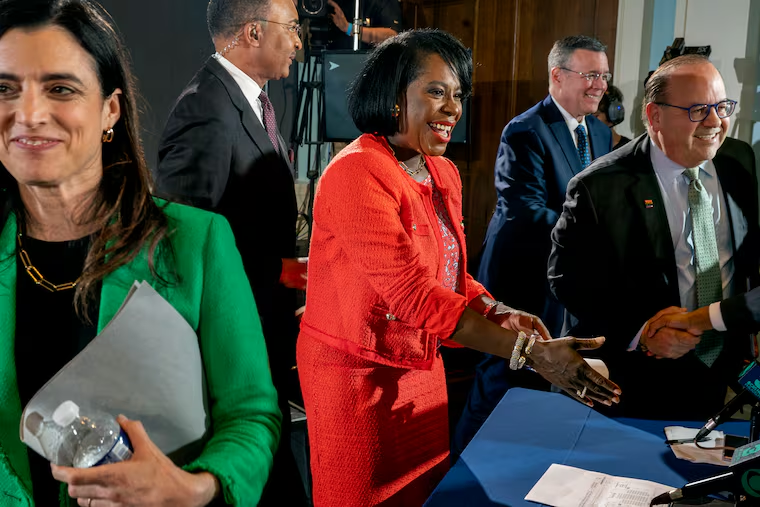Cherelle Parker is poised to make history as Philly’s first female mayor
Former City Councilmember Cherelle Parker is well-positioned to be the first female mayor of Philadelphia, one of only a few major American cities that has only ever elected men.

Cherelle Parker didn’t once say the word “woman,” but she didn’t need to.
In the midst of a heated race for Philadelphia mayor, Parker last month ran a television ad that became one of the most memorable of the campaign. It showed young girls of every race pointing to portraits of Philly mayors of yore — all of them men.
“Ninety-nine mayors,” Parker said in the commercial. “Not one looks like you or me.”
Now, she’s poised to change that.
Parker, a former City Council member, on Tuesday won the Democratic nomination for mayor, becoming the odds-on favorite to win the general election in deep-blue Philadelphia and making her well-positioned to become the first woman in city history to take the mayor’s office. Philadelphia is joined only by New York on the list of big U.S. cities never to have had a female chief executive.
» READ MORE: Philly has had 99 mayors. Not one of them was a woman.
In a February interview about the potential that she could become the first female mayor, Parker said representation is important, but stressed that identity comes second to her qualifications.
“As a Black woman,” she said, “I am not accustomed to and have never been fortunate enough to think that something would be given to me.”
And she said she hopes the election — which drew four serious female contenders — makes it less abnormal in the future for women to seek the office.
“No more glass ceilings,” Parker said. “We need the concrete pavers to lay a smooth path.”
In Philadelphia, not many women have run for mayor, and the few who tried fell far short. That made it all the more remarkable that on Tuesday, not only did Parker win, but the second- and third-place finishers, respectively, were Rebecca Rhynhart and Helen Gym. Maria Quiñones Sánchez dropped out earlier in the campaign and endorsed Parker.
“Philadelphia’s 100th mayor will be a woman of color who understands our neighborhoods and has truly demonstrated her ability to lead,” Quiñones Sánchez said in a statement. “It is a victory we can all celebrate.”
When Gym — the first Asian American woman to serve on City Council — conceded just after 11:30 p.m., she nodded to the historic nature of the results.
“Philadelphia has chosen its 100th mayor,” she said, “and elected the first Black woman to serve in the highest office in our city.”
Although a woman has never been the city’s mayor, Philadelphia’s political class has had plenty of trailblazers, especially in the legislative branch. Parker’s mentor, former Councilmember Marian Tasco, is a legendary Black politician, and today, women make up nearly 40% of City Council.
Chellie Cameron, president and CEO of the Greater Philadelphia Chamber of Commerce and the first woman to hold that role, said Wednesday she is “thrilled.”
“Philadelphia can finally say it has a woman who is going to be running this city, and a woman of color at that,” Cameron said. “I think when you’re looking across the city, you’re seeing the face of leadership change significantly. I think we make better decisions when we have people with different perspectives at the table.”
Judith von Seldeneck, the founder and chair of Diversified Search Group, who has worked to elect women across the city and state, said it was “wonderful to have so many qualified women candidates running to choose from.”
As for the results?
“Shout it from the rooftops,” von Seldeneck said. “Not only is it great for women, but it’s great for the city of Philadelphia to set an example. By gosh, talk about breaking the glass ceiling. This is huge.”
Interviews with voters suggested that identity played a role in how some women thought about the race.
Hanan Abdul-Hameed said she didn’t pay much attention to politics until recently because of the deterioration of city services in her North Philadelphia neighborhood over the last few years, but she attended Parker’s election night party just to get a chance to meet her.
”I was just fascinated with her,” said Abdul-Hameed, 40. And after 99 male Philadelphia mayors, she said, the city needs a woman to lead it.
”So many women have laid so much foundation,” she said, “and maybe we haven’t been able to reap as much benefit.”
In South Philadelphia, Yasmin Hassan, 33, said she voted for Gym in large part because her campaign had a strong presence in her neighborhood. She said she was also excited by the idea of electing the first female mayor.
”Diversity is something I want to see,” she said.
Inquirer staff writers Julia Terruso, Max Marin, Sean Collins Walsh, and Emily Bloch contributed to this article.